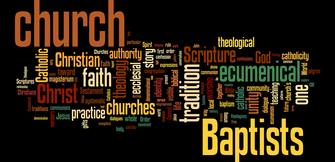 Recently some incredible research came out from Lifeway that addressed the cause for people leaving their current church. The biggest reason people leave: theology. We often hear that things like music, preaching style, or carpet color are the reasons people leave a church. But surprisingly (it shouldn't), theology matters. One quote jumps out: "Mess with the music and people may grumble. Mess with theology and they're out the door." Our theology matters. People identify with what we believe, that's why they stay at our church. I had a conversation last year with a guy looking for a church, and it became quickly obvious that our theological convictions were much too far apart for us to enjoy fellowship. That's healthy. We want to be clear about what we believe, and as leaders we have a responsibility to lead our ministries theologically. I want to propose four ways we can do that: 1. We communicate clearly what we believe - Most of our churches have a Faith Statement buried on the website or in a file folder somewhere. But we have a responsibility to communicate clearly what we believe about God, the Bible, Jesus, humanity, marriage/sexuality, and more. Faith Statements (like the Baptist Faith & Message, or any number of other confessional statements) are able to do this in a narrative format. They clearly explain, with biblical reference, our convictions on a number of issues. We don't need to preach from our faith statements, but we must constantly work to ensure that what we say we believe is what we are telling people we believe and is what we're preaching that we believe. 2. We reinforce what we believe - It's one thing to state what we believe and teach it, but we must reinforce what we believe. This is where it's important to be clear that there is room, even among a local church, for a level of disagreement on minor issues--for a helpful article on understanding big deal vs. small deal issues, check out this article by Al Mohler. As leaders, we sometimes will find ourselves having to address issues of theology. This requires us to be students of what we believe, and to have the pastoral discernment to recognize issues of urgency vs. issues of tolerance. If there are issues of urgency, we have to wisely walk through the process of loving correction. With patience and humility, point back to Scripture as the base for our theology. 3. We love what we believe - My denomination is far from perfect. There are factions and ugly situations showing up in the news almost weekly. But she's where I call home. And with that comes its confessional statement. I love it. I love what we as Baptists hold dear. I love a clear and robust theology proper of the personhood of God. I love the clear picture of the two natures of Christ. I love the Baptist distinctive of a free church in a free society, the priesthood of the believer, the commitment to global missions and church planting, and our unapologetic stance on biblical morality. As leaders, we have to love what we believe where God has placed us. If you're serving somewhere and you don't love its theology, you need to ask if God has you there to lead them to a biblical theology or if you need to leave. 4. We hold fast to what we believe - One of the saddest stories in the 20th Century Church is that of Charles Templeton. He started out with Billy Graham, but within a few years had abandoned everything he had once held and became an agnostic. Leaders, we have to hold fast to what we believe. We cannot lead people faithfully if we're not secure in our own conviction and clarity about our theology. Sure we can always be searching and probing and poking to understand better. But in our probing, let us never fall away from what we hold dear. One of the best books on theology I've read is Dug Down Deep by Josh Harris. What an appropriate title: let our foundations be deeply rooted in the bedrock of the Gospel. What would you add to the list?
0 Comments
Leave a Reply. |
Scott M. DouglasA blog about leadership and the lasting legacy of family ministry. Archives
August 2023
Categories
All
|
 RSS Feed
RSS Feed



